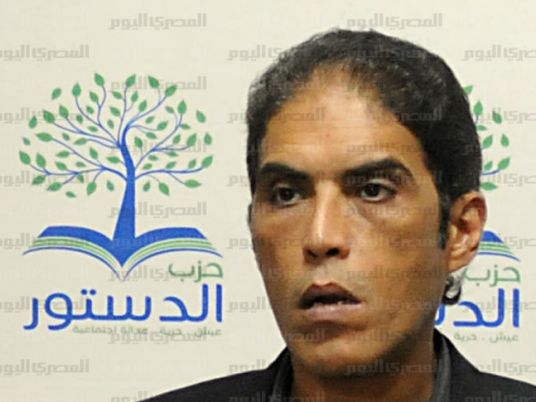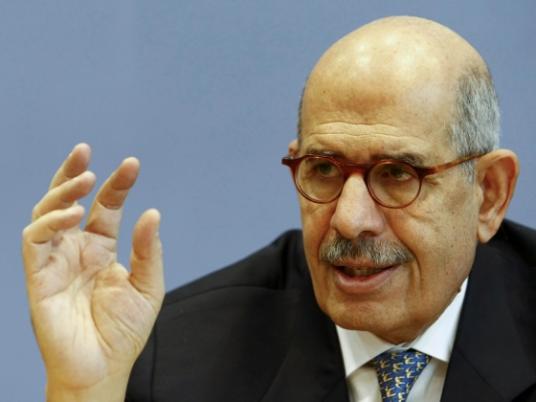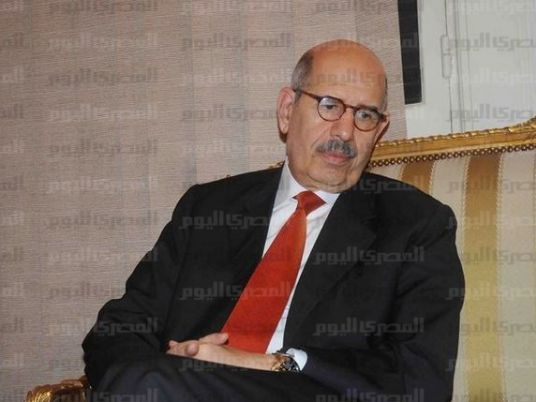Perhaps it’s fitting that Mohamed ElBaradei’s most recent arrival in Egypt was an almost polar opposite of his previous visit. This time, there were no flag-waving crowds at the airport, and no wall-to-wall media coverage. The 67-year-old former International Atomic Energy Agency chief seemed to want it that way—refusing to announce the date of his arrival.
This low-key return over the weekend seemed to symbolize a new business-like mindset in the ElBaradei camp. After his high-profile, whirlwind visit in February, during which he toured the nation’s talk shows and turned his villa on the edge of Cairo into a salon for Egyptian political forces, ElBaradei and his supporters are now settling into the ground-level work of turning his media momentum into reality.
For starters, that means a nationwide signature campaign, gathering support for his National Association for Change and their campaign to rewrite the way politics in Egypt is conducted.
“All the Egyptian people are in motion. We’re not having a hard time finding volunteers,” said Abdel Rahman Youssef, a young ElBaradei organizer. “Right now our main focus is on gathering signatures.”
The signature campaign centers around the National Association for Change’s seven-point list of demands for reform. These include ending the longstanding state of emergency, establishing polling supervision by both local judges and international monitors, allowing Egyptian expatriates abroad to vote, setting presidential term limits, and eliminating official obstacles to an independent presidential candidacy.
All told, these changes would require amendments to three separate articles of the Constitution.
It’s probably too early to judge just how the ElBaradei campaign is doing. But the next few weeks should provide crucial insight into some of the obstacles he’s bound to face in translating his momentum into grassroots political power.
Topping that list of obstacles is the fact that operating on a street-level in Egypt puts ElBaradei (or at least his supporters) within reach of the long-arm of the regime. Already there have been scattered reports of ElBaradei supporters being detained and intimidated by police and security forces.
On a political level, ElBaradei faces an immediate question that could have a long-ranging impact: Should he try to create an inclusive political umbrella that brings in established opposition political parties, or should he ignore the established parties entirely, because they are part of the dysfunctional pseudo-democratic façade he aims to demolish?
“In the eyes of the public, the opposition parties—except in very rare cases—do not represent a radical alternative to the ruling party," said Walid Kazziha, an professor of political science at the American University in Cairo. “They’re part of the system and they lend themselves to manipulation by the regime.”
Already, at least according to media reports, attempts to bring established parties into the coalition have been fraught with drama. Al-Masry Al-Youm reported last week that some leftist parties objected to the inclusion of representatives from the banned but still strong Muslim Brotherhood. Other reports have stated that venerable opposition parties like the Wafd Party are openly split on how to deal with ElBaradei, and allegations have circulated that some elements of the Wafd leadership favor striking a deal with the ruling National Democratic Party in return for a guaranteed portion of parliament seats.
“There is something new in ElBaradei. There is something fresh to what he is suggesting. It’s not clear that he will benefit from a coalition of established parties,” Kazziha said.
Egypt will have to wait and see.



